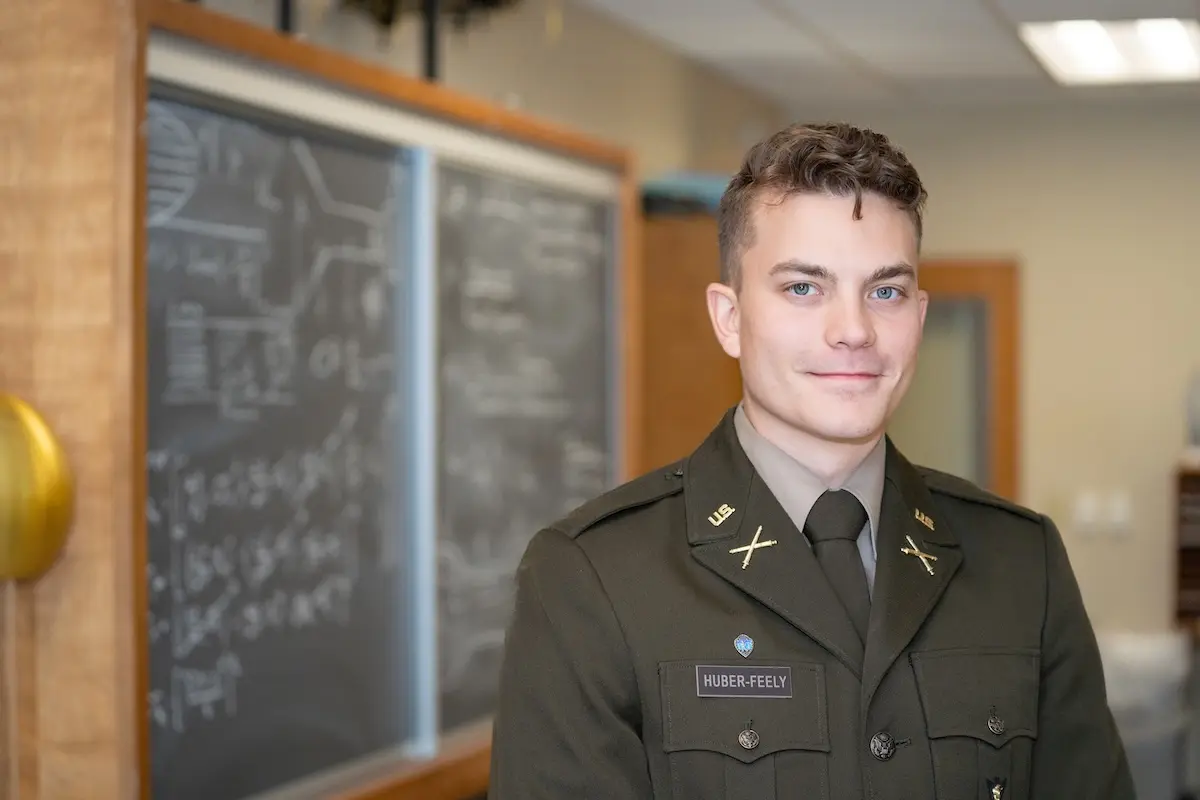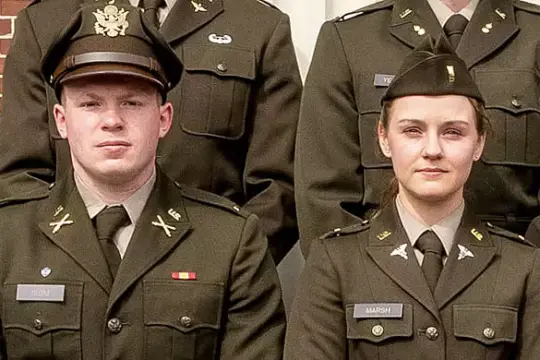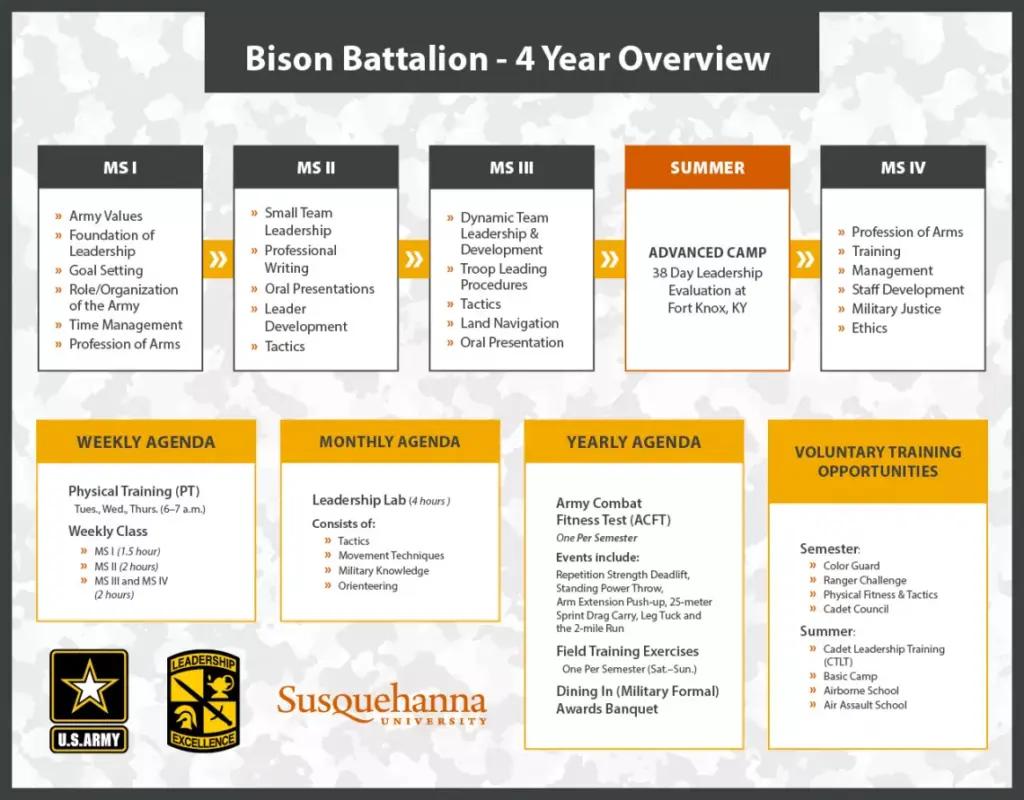Military Science & Strategic Studies
Serve and lead for something bigger than yourself.

Military Science Program
Becoming an officer in the military requires a well-rounded mind with problem-solving experience and the ability to lead. Susquehanna’s military science programs offer a military science minor and a strategic studies minor. Adding either of these minors to any major at Susquehanna will help in your quest for self-improvement and leadership in the armed forces.
ROTC Program
The Army’s Reserve Officer Training Corps program prepares college graduates for entry-level positions within the United States Army. Many graduates serve for extended periods on active duty with the regular Army; others pursue civilian careers while serving part-time in the Army Reserve or the National Guard. ROTC students are eligible for an academic stipend and scholarship assistance. Susquehanna participates in the ROTC program based at Bucknell University.
Discover your path to becoming an esteemed Army officer through the Reserve Officer Training Corps (ROTC). With a rich history since 1916, ROTC has produced more than half a million lieutenants for the U.S. Army, representing 75% of all Army officers. It’s the premier pathway for aspiring leaders in the Army, a prestigious profession serving the nation’s most respected institution.
Enroll in Army ROTC as a college elective for up to two years with no commitment. While pursuing your degree, you’ll gain invaluable experiences, blending classroom learning with hands-on opportunities. Even if you choose a different career, the acquired skills will be advantageous in civilian employment.
ROTC offers a four-year program, preparing college students to serve as commissioned officers in the active Army or part time in the Army Reserve or Army National Guard. Qualified students from Susquehanna University, Bucknell University and Bloomsburg University can join.
Program requirements include a 33-day summer training course between junior and senior years, with additional specialized summer training opportunities available. The time commitment ranges from five hours per week for first- and second-year cadets to 10 hours per week for third- and fourth-year cadets.
ROTC empowers you to succeed in college and beyond, teaching leadership development, military skills and adventure training. Graduates of the program include notable figures like Colin Powell, Sam Walton and James Earl Jones.
Join Army ROTC today, and pave your way to a successful future. For more information, contact the Susquehanna ROTC program in partnership with the Department of Military Science at Bucknell University: Phone: 570-577-1013, Email: or visit the Bison Battalion website.
Scholarships for High School Students
The Four-Year High School Scholarship was created for high school students planning on attending a four-year college program. Contact your high school academic advisor or campus Military Science department for more information.
First-year scholarship students and non-scholarship first- and second-year students can enroll on a trial basis without military commitment. You may decide to continue with advanced courses to earn an officer commission upon graduation.
Various scholarships are available, some guaranteeing duty in the Army Reserve or Army National Guard. Scholarship cadets receive full tuition, a $420/month subsistence allowance and a $1,200/year book allowance, along with room and board. Non-scholarship cadets receive a $420/month subsistence allowance.
Requirements
- Must be a U.S. citizen between the ages of 17 and 26.
- Have a high school diploma or equivalent and a high school GPA of 2.50 or higher.
- Score a minimum of 1000 on the SAT (math/verbal) or 19 on the ACT (excluding the required writing test scores).
- Meet physical standards.
- Agree to accept a commission and serve in the Army on Active Duty or in a Reserve Component (Army Reserve or Army National Guard).
Your Commitment
- An eight-year service commitment with the Army.
- Serve full-time in the Army for four years and four years with the Individual Ready Reserve (IRR).
- Selected Cadets may choose to serve part-time in the Army Reserve or Army National Guard while pursuing a civilian career.
Apply Online
If you are applying for a scholarship, first create a MY GOARMY account. Once your account is created, you will be sent to the MY GOARMY login page. Log in to MY GOARMY, and use your account information to log into the scholarship application site. For more information, visit the Army ROTC Scholarship page.
The Army ROTC – in addition to the Navy and Air Force ROTC programs – is one of the nation’s biggest scholarship grantors. The Army ROTC alone provides $274 million in scholarship money to more than 13,000 students each year, according to the U.S. Army Cadet Command.
Army ROTC, which provides leadership and military training at colleges and universities across the country, has been around for more than 100 years; however, there are many misunderstandings about the program and its scholarships. Below are three common misconceptions and their clarifications regarding the ROTC program and its awards.
Myth 1: College is automatically paid for.
One of the biggest misconceptions among families is that they assume if a student enrolls in ROTC, they will automatically receive a full scholarship.
That’s not always the case. We do offer scholarships that cover tuition, fees and other incidentals, but these are not guaranteed. Scholarship selection is a competitive process, similar to any other scholarship application. Some students complete ROTC programs – earning a commission as a second lieutenant – without ever earning a scholarship.
Army ROTC scholarships are awarded in two different ways: students can compete nationally for a scholarship during their senior year of high school; or they can join ROTC once they get to college and compete for a scholarship at the campus level.
At the national level, about 12,000 high school seniors compete for about 2,000 Army ROTC scholarships. Approximately half are three-year scholarships, and half are four-year scholarships. The application process is open for those who have completed their junior year of high school.
The majority of high school scholarship recipients are in the top 25% of their class, belong to an honor society and participate in organizations or sports. ROTC is looking for scholars, athletes and leaders. Students should be working on building a résumé early in their high school careers.
Excel in school. Prepare yourself for the SAT or ACT. Join the National Honor Society. Active students tend to naturally be great candidates for the Army ROTC with the possibility of a full-tuition scholarship.
If a student misses out on the national scholarship contest, there is still an opportunity to join ROTC and compete for a scholarship once they are enrolled in college.
If awarded a scholarship, Cadets are allowed to choose between applying the scholarship toward full tuition and fees – no matter the institution – or room and board, up to $5,000 per semester.
Myth 2: Joining ROTC means you’re enlisting.
Students can do a two-year trial period with Army ROTC before making commitments to the Army. However, when a student accepts a scholarship, they sign a contract with ROTC promising to hit certain academic benchmarks and to serve in the armed forces after graduation. This is called “contracting.”
The scholarship does bind them to service. Not every student walks into that classroom ready to make that commitment.
The service obligation is generally eight years and can be on active duty, National Guard, Army Reserve, IRR or a combination.
If a student does not meet the program’s requirements, gets expelled from school or does not commission into the Army, they will likely have to pay the scholarship back. The exception is if a medical condition prevents someone from joining.
Myth 3: You could be called up.
An ROTC Cadet is considered non-deployable in the event that the United States goes to war, even if the Cadet is part of a National Guard unit that deploys.
If a student is in ROTC, he is just a student. Once they are commissioned, they become a part of the Army.
Future Ready Leaders
Two Susquehanna University cadets have been named Distinguished Military Graduates for 2023 and credit opportunities at Susquehanna for contributing to their growth as future military leaders.

Explore Your Studies
Program Resources

Learn and apply principles of effective leading. Develop communication skills to improve individual performance and group interaction. Relate organization ethical values to the effectiveness of a leader. 4 SH.
Learn and apply ethics-based leadership skills. Develop skills in oral presentation, concise writing, event planning, and coordinating group efforts. 4 SH.
Focuses on leading a small group of individuals. Examines the role of the leader, military leadership concept, personal character, decision making, implementing decisions, motivation, supervision, and training. 4 SH.
Series of practical opportunities to lead groups, receive personal assessments and lead again in situations of increasing complexity. Plan and conduct training for younger students to teach and develop leadership skills. 4 SH.
Analyze tasks; prepare written or oral guidance for students to accomplish tasks. Delegate tasks and supervise. Plan for and adapt to the unexpected in organizations under stress. 4 SH.
This course will examine the military heritage of the United States from the colonial period to the late twentieth century. The goal of the course is to develop students’ awareness of the relationship of the U.S. military establishment to American society. Further, the course will focus on the evolution of war and strategy and in the progression of military professionalism, with an emphasis on the history and purpose of joint operations, and discuss the role of history and heritage in understanding the Army profession. 4 SH.
Plan, conduct and evaluate activities of the ROTC cadet organization. Articulate goals, put plans into action to attain them. Develop confidence in skills to lead people and manage resources. 4 SH.
Continues the methodology from ROTC-401. Identify and resolve ethical dilemmas. Refine counseling and motivating techniques. Prepare for a future as a successful army lieutenant. 4 SH.
Individual work on selected topics for qualified students under faculty supervision. 1-4 SH.
When you enroll at Susquehanna, you’ll be paired with an advisor and application tool to guide you in your course planning and scheduling. The following is an excerpt from the complete course catalog. Enrolled students follow the requirements of the course catalog for the academic year in which they declare each major and/or minor and consult with their advisor(s).
Minor in Military Science
The minor in military science consists of:
- ROTC-301
- ROTC-302
- ROTC-401
- ROTC-402
And one course from each of the following two areas:
Human Interactions:
- PSYC-230 Social Psychology
- PSYC-340 Cognitive Psychology
- PSYC-350 Psychology, Culture and Ethnicity
Ethics:
- RELI-107 Faiths and Values
- PHIL-122 Resolving Moral Conflicts
None of the courses in the military science minor may be applied to the student’s major.
Where Passion Meets Purpose
Straight from the Nest

“Susquehanna University has enabled me to become a well-rounded academic, soldier and leader. I have been in music groups, the Army Reserves and a variety of classes that have contributed to the confidence I have gained in my ability to take the next step post-graduation.”
— Preston Isom ’23
TAKE A VIRTUAL TOUR
Launch WelcomeHave Questions?
Contact Us
Start your journey.
